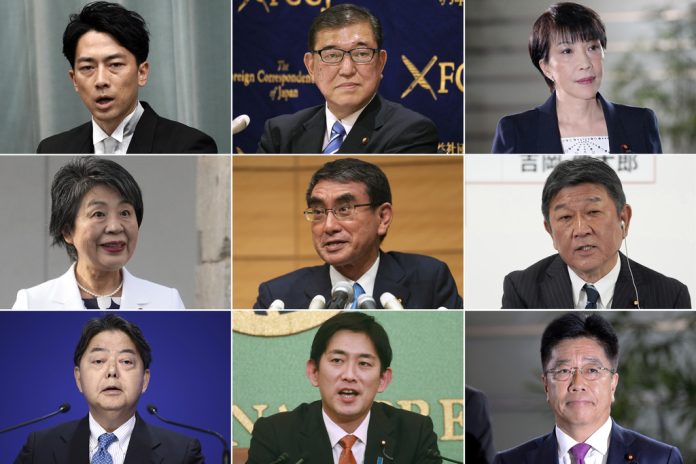TOKYO (AP) — A record nine Japanese lawmakers formally entered the race on Thursday to replace outgoing Prime Minister Fumio Kishida as head of the governing party and leader of the nation, hoping to regain public support for the party following corruption scandals.
Voting in the Sept. 27 Liberal Democratic Party leadership contest is limited to its lawmakers and 1 million dues-paying grassroots members, with the winner assured of becoming prime minister because of the governing coalition’s domination of parliament.
The vote comes as Japan is seeking to play a greater role in regional security, economics and diplomacy in response to threats from China, North Korea and Russia.
Kishida, who took office in 2021 and backed a rapid military buildup and doubling of defense spending, announced last month he is stepping down when his current three-year term as party leader and prime minister ends in September to allow a new leader to shake off damage from the corruption scandals.
The nine candidates include two women. None is expected to win a majority in the first round of voting because of the large number, and a runoff is likely.
Many of the candidates have stressed their ability to achieve reforms and tackle pressing issues such as Japan’s declining birthrate, stagnating incomes, gender inequality and security threats.
“I will do everything to protect Japan,” Shigeru Ishiba, a former defense minister and a favorite among the public, said in his 10-minute policy speech at the party headquarters. He called for the formation of an Asian version of NATO, noting that North Korea has test-fired missiles that have landed in waters off Japan’s western coast.
“This vote is about whether the LDP can change, and who can change it,” said former Environment Minister Shinjiro Koizumi, a leading contender and the son of former popular Prime Minister Junichiro Koizumi. “As prime minister, I will change Japan, which has fallen behind the times.”
Koizumi pledged to accelerate reforms to create a society with greater choices for people, including the option for married women to keep their maiden names, a change that has been stalled for decades by his party’s conservatives.
Digital Minister Taro Kono, another popular candidate who has served as defense and foreign minister, said Japan cannot rely solely on the United States for its protection and should play a greater role in regional security. “Unlike past leadership elections, when we mainly discussed the shape of our country, this race is about discussing how to shape the world,” Kono said.
Foreign Minister Yoko Kamikawa, seeking to become Japan’s first female prime minister, said, “The single fact that I’m standing here at the starting line shows there is a new LDP, and it’s a big step forward.”
Party leadership votes used to be largely power struggles decided by leaders of rival factions who typically endorsed one candidate from their group, often by seniority. But reforms introduced by Kishida following a money donation scandal led to the dissolution of all but one faction, that led by former Prime Minister Taro Aso. That has allowed more diverse candidates, including younger lawmakers, to come forward.
Also running are Economic Security Minister Sanae Takaichi, former Economic Security Minister Takayuki Kobayashi, Chief Cabinet Secretary Yoshimasa Hayashi, party Secretary-General Toshimitsu Motegi and former Health Minister Katsunobu Kato.
Starting Thursday, the candidates will campaign around the country to appeal to party supporters and participate in joint speech and debate sessions in Tokyo.
Source: post





